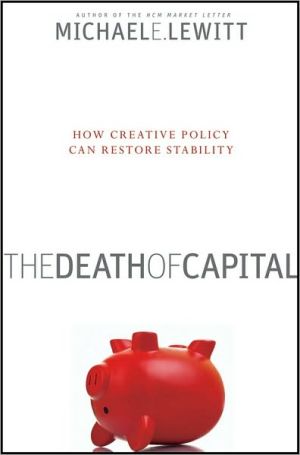The Death of Capital: How Creative Policy Can Restore Stability
Praise for the Death of Capital\ "In an era of books on the financial crisis, this one is a significant standout. Michael demonstrates a keen understanding of the factors that led to the financial abuses of the past decade and equally importantly advances sound ideas for financial reform. A very engaging and worthwhile read!"\ Leon G. Cooperman, Chairman and CEO, Omega Advisors, Inc.\ "Michael Lewitt is a very thoughtful presenter of facts and conclusions in his regular market letter. He has...
Search in google:
While some semblance of stability has returned to the financial markets, the economies on which these markets must ultimately depend remain structurally weak, and the path toward sustained growth will be difficult. In order to set the economy on a sounder path, we need to understand the sources of instability that caused the failure of the financial system, rethink established ideas, and challenge the intellectual and moral authority of the institutions that control the world's capital. The system is badly broken and we must figure out how to fix it before it is too late.Written by respected portfolio manager and longtime investment professional Michael Lewitt, The Death of Capital looks at how, in recent years, the U.S. economy has increasingly been dominated by short-term speculation rather than productive investment, debt rather than equity, and short-term thinking rather than long-term planning. These disastrous trends, described here as "financialization," ignore the fact that capital is a highly unstable social process rather than a fixed, historical object or category. As a result of our failure to understand the true nature of capital, we have developed a financial and regulatory system that does exactly the opposite of what it should be doing—favoring obscurity over transparency and fomenting instability rather than a stable path to growth.In explaining where we have gone wrong, Lewitt pulls few punches in criticizing some of the counterproductive forces that have led to the death of capital—including Wall Street practices such as private equity and derivatives trading—which he views both as economically unproductive and morally bankrupt. Page by informative page, this timely guide:Explores the most important aspects of capital and capitalism through the prism of four of the world's great economic thinkersAddresses "financialization" and'its consequences, such as a weaker U.S. dollar, the decline of American industries, and the loss of American economic and political hegemonyExamines how the legal system contributed to economic deterioration by privileging short-term profitability above other important societal interests such as labor, the environment, and social welfareCalls for politically controversial reforms such as stricter regulation of hedge funds and private equity firms, banning naked credit default swaps and off-balance sheet financing vehicles, imposition of a Tax on Speculation, and principles-based reforms to improve systemic stabilityAnd much moreFilled with in-depth insights and practical advice, The Death of Capital is not just a play-by-play of the recent financial crisis, but also an original and passionate analysis of the trends that led to it and how the financial system can be reformed to avoid future crises.
Acknowledgments. Introduction: The 2008 Crisis – Tragedy or Farce? Chapter One: The Death of Capital. Chapter Two: Capital Ideas. Chapter Three: Empty Promises. Chapter Four: Financialization. Chapter Five: From Innovators to Undertakers. Chapter Six: Welcome to Jurassic Park. Chapter Seven: The Road to Hell. Chapter Eight: Finance After Armageddon. Conclusion: “This Is Later”. Notes. Bibliography. About the Author. Index.








